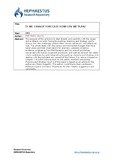| dc.contributor.author | Makridakis, Spyros | |
| dc.date.accessioned | 2015-12-08T09:49:22Z | |
| dc.date.available | 2015-12-08T09:49:22Z | |
| dc.date.issued | 1981 | |
| dc.identifier.issn | 0024-6301 | |
| dc.identifier.uri | http://hdl.handle.net/11728/6375 | |
| dc.description.abstract | The purpose of this article is to deal directly and explicitly with the issues and problems currently facing forecasting, planning and strategy and to discuss how the challenges of the 1980s can be realistically and effectively met. The article deals with the various environmental changes that have taken place and their implications for planners; presents empirical evidence, originating from the literature and the area of psychology concerned with human judgment processes; and outlines several new ideas which contribute towards integrating forecasting, planning and strategy and dealing with the turbulent enviroment of the future. This article is based on Chapter 7 of a forthcoming book by the author entitled Forecasting, Planning and Strategy (part 2 of the paper is based on an article by the author and Robin Hogarth). The author would like to thank professors Phillippe Lassere and heinz Thanheiser for their helpful suggestions and comments. | en_UK |
| dc.language.iso | en | en_UK |
| dc.publisher | Elsevier | en_UK |
| dc.relation.ispartofseries | Long Range Planning;Vol. 14, No.3 | |
| dc.rights | Copyright © 1981 Published by Elsevier Ltd. | en_UK |
| dc.rights.uri | http://creativecommons.org/licenses/by-nc-nd/4.0/ | en_UK |
| dc.subject | Research Subject Categories::SOCIAL SCIENCES::Business and economics | en_UK |
| dc.title | If we cannot forecast how can we plan? | en_UK |
| dc.type | Article | en_UK |


